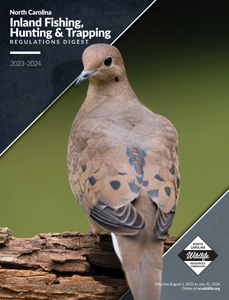Welcome to North Carolina Hunting

What’s New For the 2023–2024 Season
As part of the Commission’s ongoing effort to keep you informed, we reserve this page of the digest each year to identify significant regulatory, legislative, and agency-related changes that you should be aware of each season. Please note that the information found on this page is not a complete list of regulation changes. For your convenience, all regulation changes appear throughout the digest in RED.
Hunting
- The antlerless gun deer season on private lands has been increased from 1 day to 6 days in Madison county, from 6 days to 13 days in Avery, Burke, Caldwell, Mitchell, and Yancey counties, and from 2 weeks to 4 weeks in Cleveland, Polk, and Rutherford counties. See Deer Zone Maps for details.
- In Madison county, antlerless deer may be taken throughout the entire blackpowder season.
- Special Chronic Wasting Disease regulations are in effect in the following counties: Alexander, Alleghany, Ashe, Bladen, Cumberland, Davie, Forsyth, Guilford, Harnett, Hoke, Iredell, Robeson, Rockingham, Sampson, Stokes, Surry, Wilkes, and Yadkin. See CWD Surveillance Areas and Special Regulations for details.
- New rules prohibit the possession and use of some types of attractants and scents. See General Hunting Regulations for details.
- Hunters can now validate and register their big game harvests through the GoOutdoors North Carolina App, either with or without internet service. See General Hunting Regulations for details.
Trapping
- The start date for the statewide trapping season has been changed to October 1. See Trapping Regulations.
- Clarified that all traps, including snares, Collarum™-type traps, foothold traps, Conibear™-type traps, cage traps, and box traps, including box traps for rabbits, must have a weather-resistant permanent tag identifying the person who set the trap. See Trapping Regulations.
What’s New For the 2022–2023 Season
As part of the Commission’s ongoing effort to keep you informed, we reserve this page of the digest each year to identify significant regulatory, legislative and agency-related changes that you should be aware of each season. Please note that the information found on this page is not a complete list of regulation changes. For your convenience, all regulation changes appear throughout the digest in RED.
Hunting
- A spring season for hunting gray squirrels on private lands has been established. See Small Game & Other Seasons.
- In March 2022, the first detection of Chronic Wasting Disease (CWD) was confirmed in a hunter-harvested buck from Yadkin County. In response to CWD, special regulations apply in all or parts of Alleghany, Davie, Forsyth, Iredell, Surry, Stokes, Wilkes, and Yadkin Counties. See CWD Surveillance Areas and Special Regulations or visit ncwildilfe.org/cwd for more information.
- Removed the restriction on hunting raccoons during daylight hours west of US 1. See Small Game & Other Seasons.
- It is now mandatory to submit at least one premolar tooth from your harvested bear by January 31st following the applicable bear hunting season. See Bear Regulations.
- Blackpowder either-sex deer season is now linked to the corresponding either-sex gun season for each county. See the section on blackpowder either-sex season in Deer Regulationsfor more information.
- Federal Harvest Information Program (HIP): The federal HIP Certification which is needed to hunt Migratory Game Birds (waterfowl, doves, rails, gallinule, snipe and woodcock) will no longer be valid for 12 months from the date requested. The HIP Certification will be available July 1 each season and expire on June 30 each year. This change aligns the HIP Certification with the Migratory Game Bird hunting seasons.
Non-Game
- A collection licenses is required for the take, possession, or transportation of four or more individual snapping turtles. No more than 10 snapping turtles may be taken per person per day (100 turtles per person per year) and turtles must have a minimum curved carapace length of at least 13 inches. No more than 15 trapping devices may be set per license and devices must be labeled with a waterproof tag showing the licensee’s name, WRC customer number or collection license number. Traps must be checked daily.
- Collection Licenses for snapping turtles are only available to North Carolina residents.

